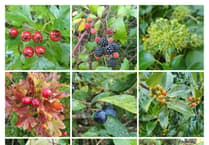THE decision on the historic right to wild camp on Dartmoor has been deferred by the High Court in London.
Dartmoor National Park is fighting the legal case which questions the basis of its bylaws allowing for responsible wild camping.
Dartmoor is the only place in England and Wales where it is legal to wild camp in designated areas, without a landowner’s permission. While all the land in the national park is in private hands, local farmers, known as commoners, have long had rights to graze their livestock on unenclosed parts of the moor.
People have also camped in these areas for at least 100 years, with bylaws brought in under the Dartmoor Commons Act in the mid-1980s enshrining it as a right.
The owner of Stall Moor, Alexander Darwall, claims there is no legal right to wild camp on Dartmoor. Mr Darwall, a hedgefund manager, and his wife Diana, rent out cottages and offer pheasant shoots and deer stalking on their moorland estate - 2,784 acres of registered common land between the Yealm and Erme Rivers on South Dartmoor.
Campaigners fighting for the right to wild camp on Dartmoor have launched a ‘The Stars are for Everyone’ campaign. Campaigner Emma Linford, an expedition leader and wilderness guide who attended the court hearing said: “We saw at our peaceful rallies in Princetown and London over the past few days the huge opposition to this case – which at its heart is about rolling back the public’s right to enjoy a peaceful act of recreation and deep connection with nature.
“In the past two days possibly more than a hundred thousand pounds has been spent on lawyers’ fees. This is money which, at a time of huge economic pressure, could have funded an education campaign to teach literally every visitor to Dartmoor how to do so responsibly, or paid for the salaries of an extra Dartmoor park ranger several times over.
“This is a horrific misdirection of funds – attacking an ancient custom on the moor much beloved by people of all ages and backgrounds, 99.9 per cent of whom leave no trace, and doing nothing to tackle the real threats to Dartmoor’s delicate ecology that it purports to be all about.”
Dartmoor is the only place in England and Wales where it is legal to wild camp. It is permitted across 70,000 acres of the national park: the size of just 0.2 per cent of England.
The activity is guided by a Code of Conduct – whose principles include ‘leave no trace’, a maximum camping duration of two nights in any one place, and the capacity to carry everything you need for your stay in one backpack and to camp away from roads.
Author Raynor Winn said: “Wild camping, the act of travelling on foot for one or two nights, carrying everything you need in a backpack, gives us access to something which is not possible through other means – the freedom to be out in the wild. Dartmoor is the last remaining place where this freedom is allowed in England and Wales and wild camping is very much part of the ethos and culture of the area.
“So many people for years now since the right was enshrined on Dartmoor have had access to the freedom that wild camping brings… to be able to travel without restriction of time or destination.
“It is a right that has given so much to young people, to older people, to every generation. It would be a great tragedy to lose this, the final portion of land where we have been able to exercise what has, for millennia, has been a birthright.”
Author Robert Macfarlane added: “It’s appalling that multi-millionaire land-owners are taking legal action to deny the public our long-established and much-beloved right to wild camp on areas of Dartmoor.
“A night under Dartmoor’s skies has been a mind-opening, life-shaping experience for tens of thousands of people down the decades, the overwhelming majority of whom have camped responsibly and left no trace.
“Dartmoor is the only place in England where it’s legal to wild camp; we need to defend that right on Dartmoor, and then extend it more widely across England.
“At this moment of ecological crisis we’ve never needed these opportunities to connect deeply with nature more”.





Comments
This article has no comments yet. Be the first to leave a comment.